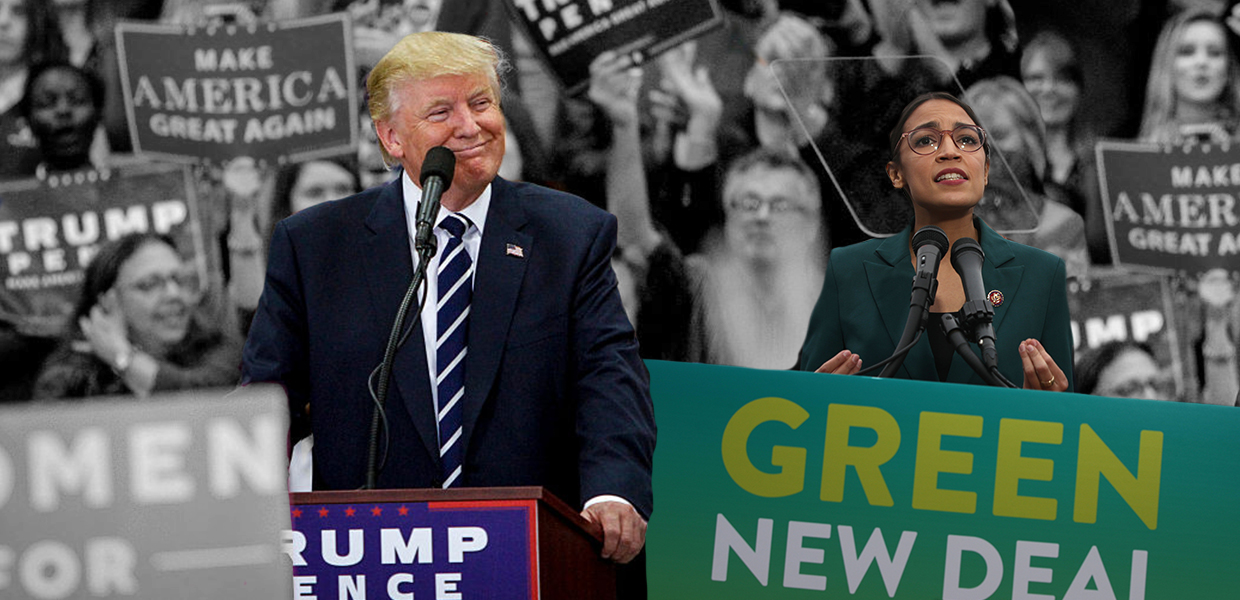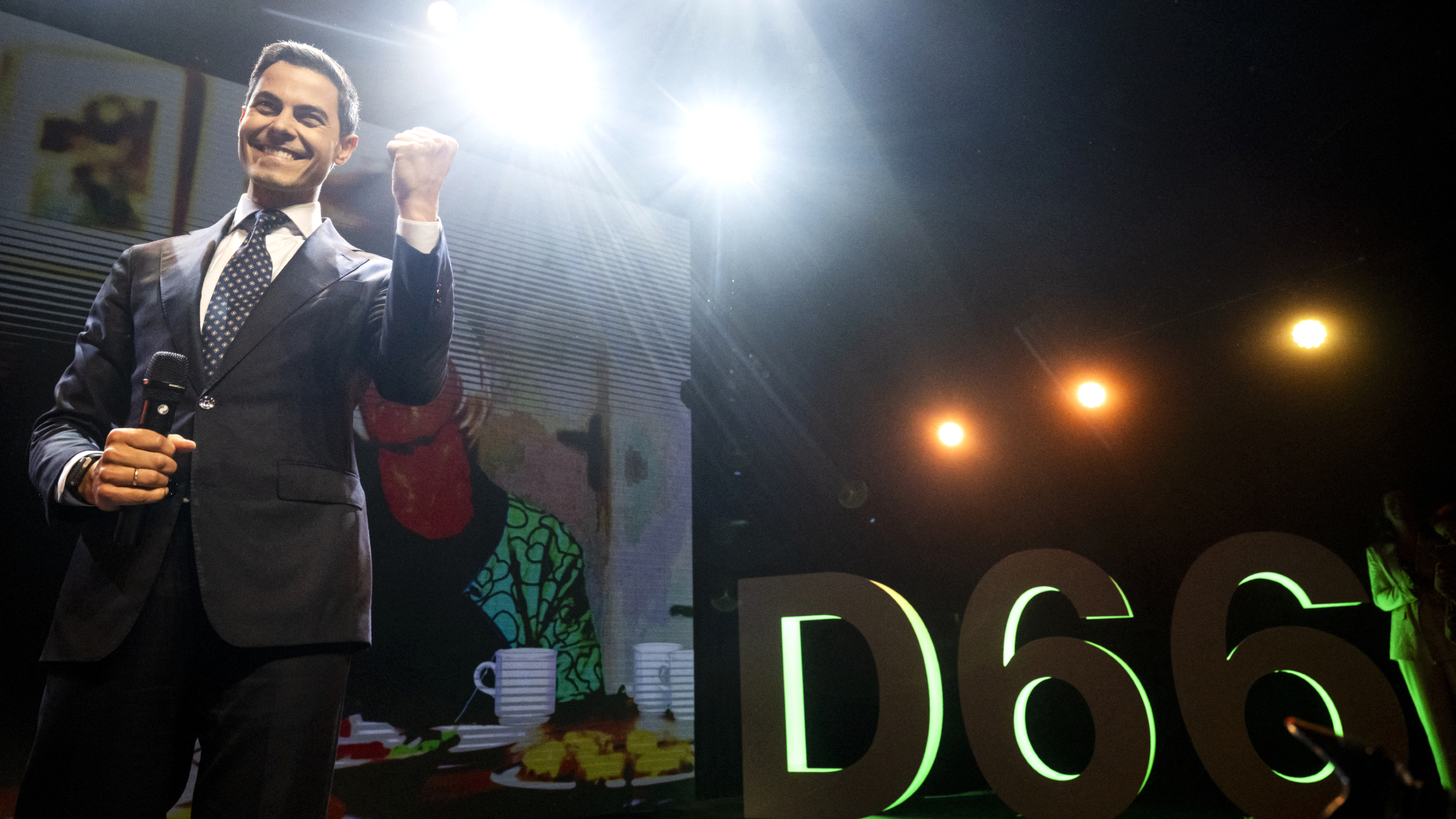How Trump wins in 2020
The president will weaponize socialism for the culture war


A free daily email with the biggest news stories of the day – and the best features from TheWeek.com
You are now subscribed
Your newsletter sign-up was successful
If you want to know how President Trump can win re-election in 2020, you need only look at the headlines emanating from the Democrats over the past couple of weeks.
It's not just one headline. It's the cumulative effect of them all.
It's also not as simple as saying that the Democrats are "moving too far to the left." There is ample polling evidence to suggest there is room for the party to shift in a more progressive direction on some issues, especially those touching on the economic struggles of ordinary Americans. Higher taxes for the richest Americans. Single-payer health care. Aggressive environmental policies to combat climate change. Free college tuition. Child care for all. The list of possible initiatives is long, and combining higher taxes with any one or two of them could make a powerful and popular agenda for a Democrat hoping to unseat the president, in part by stealing his populist thunder and exposing the plutocratic agenda that he and his party stand for.
The Week
Escape your echo chamber. Get the facts behind the news, plus analysis from multiple perspectives.

Sign up for The Week's Free Newsletters
From our morning news briefing to a weekly Good News Newsletter, get the best of The Week delivered directly to your inbox.
From our morning news briefing to a weekly Good News Newsletter, get the best of The Week delivered directly to your inbox.
But that's not the message Democrats have been sending.
The Green New Deal that several of the leading presidential candidates have co-sponsored is a far-left wish list — the progressive equivalent of Ted Cruz's 2016 proposal to institute a flat tax and abolish four Cabinet-level departments of the executive branch — combined with the risible suggestion that the trillions of dollars of resulting spending can be paid for simply by running gargantuan deficits on top of the massive debt the Obama and Trump administrations have already piled up. And if that weren't enough, the FAQ page about the Green New Deal that Rep. Alexandria Ocasio-Cortez's office briefly released and then withdrew added on what sounded like material from a Monty Python skit devised to ridicule environmentalists. End air travel! Kill all the cows to save us from the scourge of bovine flatulence!
But even that isn't sufficient to give Trump a solid path to victory in 2020. It's still very early. There's plenty of time for candidates to distance themselves from the most utopian and absurd elements of the Green New Deal — and to use some of its details as a foil for their own comparatively modest plans. (Thanks to Ocasio-Cortez, Medicare-for-all already looks considerably more sober and responsible than it did a week ago.)
Yes, Trump will denounce anything the Democrats propose as "socialism." But if the Democratic message resonates with the widespread conviction, shared by many Trump voters, that the economy is rigged by and for the wealthy, the charge will feel hollow, desperate, and self-serving.
A free daily email with the biggest news stories of the day – and the best features from TheWeek.com
Unless, that is, Trump uses the epithet to mean more than a drive to rein in the economic inequality and injustice that permeates American life.
To get a sense of how Trump could deploy a more expansive definition of the term "socialism" to do maximal electoral damage to the Democrats, I suggest close and regular reading of the blog of Rod Dreher at The American Conservative. Last week Dreher announced that he's planning a new book, timed for the fall of 2020, about the threat that socialism poses to the United States in general and to conservative Christians and other traditionalist religious believers in particular. In Dreher's view, the threat goes far beyond the worry that pious Americans who happen to be well off will face higher taxes. The danger that socialism supposedly poses to the kind of people who read Dreher's blog has much more to do with what might be described as cultural totalitarianism.
Those who follow the world of conservative ideas will recognize the argument as one associated with the Polish writer and former anti-Communist dissident Ryszard Legutko. In a book published in this country in 2016, The Demon in Democracy: Totalitarian Temptations in Free Societies, Legutko claimed that the secular liberalism that has come to dominate Central and Eastern Europe in the years since the end of the Cold War is less different from the communist totalitarianism it replaced than is typically acknowledged. Both systems are holistic ideologies that despise genuine pluralism. Both seek to drive out competing visions of humanity and the world. And both are fundamentally intolerant of dissent.
Dreher is proposing to adapt and apply this argument to the United States, describing a country confronting what he calls the "Woke Menace" of a newly radicalized and emboldened left that aims to centralize power and stamp out all dissent. Those who believe in the sanctity of traditional marriage, who think that the free exercise of religion goes beyond worshipping in church and private homes, who therefore believe that devout Christians (and Jews and Muslims) should be free (in some instances) to discriminate against homosexuals and the transgendered, who consider abortion to be murder and abortion in the third trimester to be infanticide — Americans who hold these and similar views find themselves confronting the prospect of a party gaining power that considers every one of these positions not just erroneous but fundamentally illegitimate, beyond the moral pale, rooted in irrational animus and bigotry, and worthy of being excommunicated from public life.
Social conservatives have known for a long time that many progressives view them that way — as ignorant bigots whose benighted prejudices should be excluded from power whenever and wherever possible. Until recently, these conservatives have consoled themselves with two presumptions. First, they've assumed that however influential such progressives might be in the media, on college campuses, and on the Supreme Court, they were somewhat hemmed in by an electorate that preferred Democrats who talked about making abortion "safe, legal, and rare" and at least paid lip service to the importance of the traditional family. Second, they've hoped and believed that this underlying conservatism of the electorate would ultimately deliver them sufficient political power to reverse the country's long-term political and cultural drift in a progressive direction.
Events of the past decade have disabused social conservatives of both presumptions. Democrats are more culturally left-wing than ever, and the hourly outrages of the Trump presidency have emboldened them to abandon the restraints that once bound them. At the same time, Trump's very immorality — his embodiment of so many of our ailing culture's sins — along with the narrowness of his win in 2016 have convinced these social conservatives that their every victory is precarious, a mere hair's breadth away from a reversal that will usher in the final triumph of absolute moral degradation in America and an end to their own freedom to live and worship as they wish.
This is what Dreher means by "socialism" — the attempt by the left to seize total control and use every power at its disposal (political, economic, cultural, technological) to smash its moral opponents, once and for all.
Imagine a general election campaign in which the Republican Party and the Trump campaign supplemented the president's Twitter-based rabble-rousing and inevitable personal attacks on the Democratic nominee with a resolutely anti-socialist message — with socialism understood in this broad, comprehensive sense. The point wouldn't be just to raise fears of higher taxes and bigger government but to fold that anxiety into the culture war, where Trump's political skills are most formidable.
"It's me or progressive totalitarianism" — that's how Trump wins in 2020.
Damon Linker is a senior correspondent at TheWeek.com. He is also a former contributing editor at The New Republic and the author of The Theocons and The Religious Test.
-
 Is Andrew’s arrest the end for the monarchy?
Is Andrew’s arrest the end for the monarchy?Today's Big Question The King has distanced the Royal Family from his disgraced brother but a ‘fit of revolutionary disgust’ could still wipe them out
-
 Quiz of The Week: 14 – 20 February
Quiz of The Week: 14 – 20 FebruaryQuiz Have you been paying attention to The Week’s news?
-
 The Week Unwrapped: Do the Freemasons have too much sway in the police force?
The Week Unwrapped: Do the Freemasons have too much sway in the police force?Podcast Plus, what does the growing popularity of prediction markets mean for the future? And why are UK film and TV workers struggling?
-
 ‘Poor time management isn’t just an inconvenience’
‘Poor time management isn’t just an inconvenience’Instant Opinion Opinion, comment and editorials of the day
-
 Kurt Olsen: Trump’s ‘Stop the Steal’ lawyer playing a major White House role
Kurt Olsen: Trump’s ‘Stop the Steal’ lawyer playing a major White House roleIn the Spotlight Olsen reportedly has access to significant US intelligence
-
 Japan’s Takaichi cements power with snap election win
Japan’s Takaichi cements power with snap election winSpeed Read President Donald Trump congratulated the conservative prime minister
-
 How realistic is the Democratic plan to retake the Senate this year?
How realistic is the Democratic plan to retake the Senate this year?TODAY’S BIG QUESTION Schumer is growing bullish on his party’s odds in November — is it typical partisan optimism, or something more?
-
 The billionaires’ wealth tax: a catastrophe for California?
The billionaires’ wealth tax: a catastrophe for California?Talking Point Peter Thiel and Larry Page preparing to change state residency
-
 Bari Weiss’ ‘60 Minutes’ scandal is about more than one report
Bari Weiss’ ‘60 Minutes’ scandal is about more than one reportIN THE SPOTLIGHT By blocking an approved segment on a controversial prison holding US deportees in El Salvador, the editor-in-chief of CBS News has become the main story
-
 Has Zohran Mamdani shown the Democrats how to win again?
Has Zohran Mamdani shown the Democrats how to win again?Today’s Big Question New York City mayoral election touted as victory for left-wing populists but moderate centrist wins elsewhere present more complex path for Democratic Party
-
 Dutch center-left rises in election as far-right falls
Dutch center-left rises in election as far-right fallsSpeed Read The country’s other parties have ruled against forming a coalition
